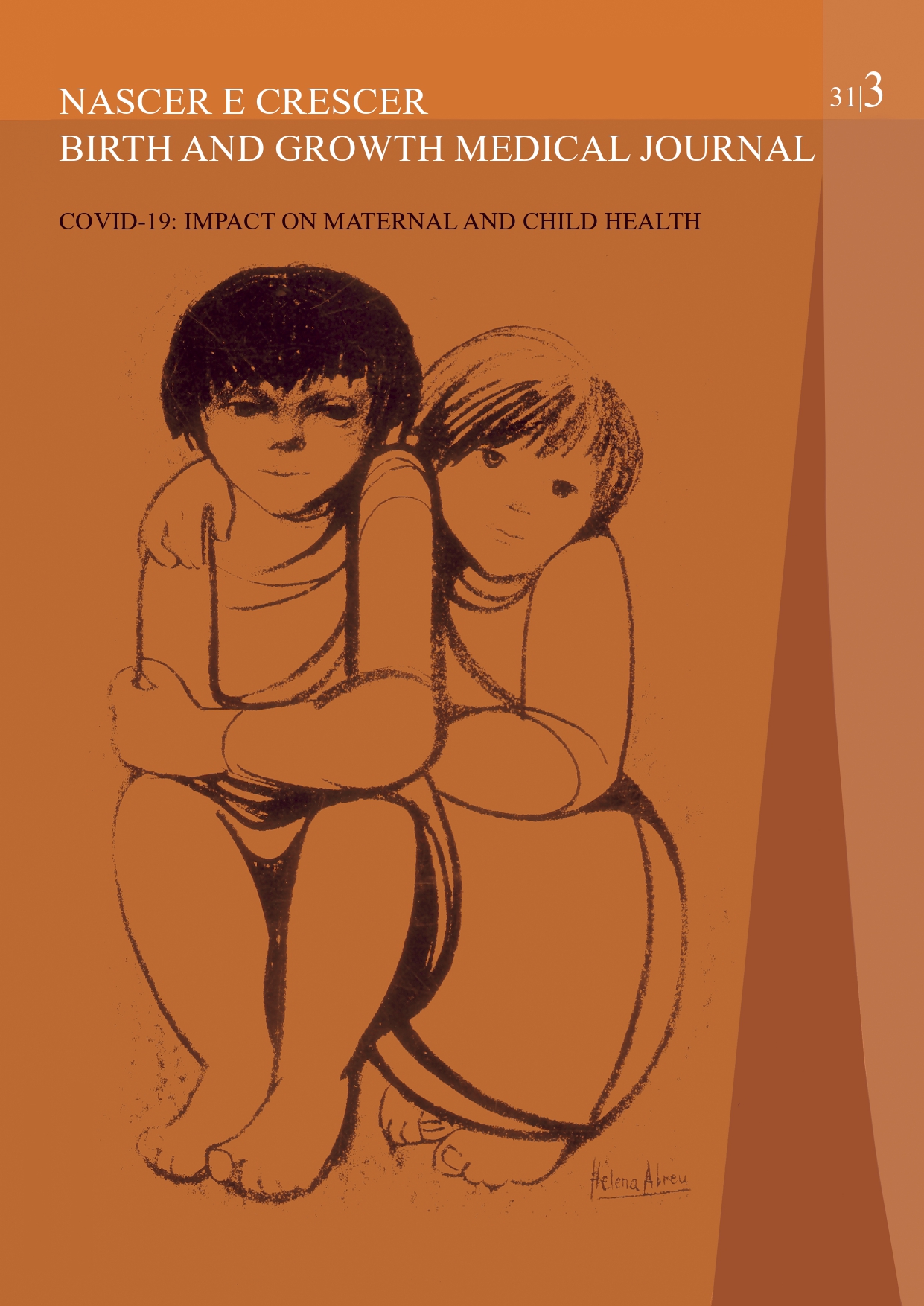Aleitamento materno durante a pandemia de COVID-19: Experiência de uma Unidade de Neonatologia
DOI:
https://doi.org/10.25753/BirthGrowthMJ.v31.i3.21503Palavras-chave:
aleitamento materno, covid-19, Neonatologia, SARS-CoV-2Resumo
Introdução: A doença pelo novo coronavírus (COVID-19) originou uma crise de saúde global, desafiando a abordagem de mães e recém-nascidos. A falta de evidência robusta acerca dos efeitos da infeção na gravidez e no recém-nascido colocou em causa práticas estabelecidas, como o alojamento conjunto e o aleitamento materno. Os autores apresentam os resultados do seguimento de recém-nascidos de mães com infeção por SARS-CoV-2 numa Unidade de Neonatologia de nível III, com especial enfoque no tipo de alimentação implementado.
Material e métodos: Foi realizado um estudo longitudinal baseado no registo de recém-nascidos de mães com infeção confirmada por SARS-CoV-2 durante sete meses (1 de abril─31 outubro 2020). As orientações da instituição foram atualizadas durante esse período. Foram registados dados obstétricos e neonatais e efetuado o seguimento da mãe e recém-nascido durante o primeiro mês após a alta através de teleconsulta semanal.
Resultados: Catorze díades de recém-nascidos/mães SARS-CoV-2-positivas foram abordadas de acordo com as orientações clínicas vigentes na instituição. Na alta, metade dos recém-nascidos encontrava-se a receber aleitamento materno exclusivo e outra metade leite de fórmula (quase todos devido à separação inicial entre mãe e recém-nascido). A 1 mês de seguimento, 71% dos recém-nascidos estavam sob aleitamento materno, 80% dos quais em exclusivo.
Discussão: As taxas de aleitamento materno na alta foram influenciadas pela fase de abordagem da instituição. Um mês após a alta, estas taxas foram inferiores a alguns resultados nacionais, possivelmente refletindo dificuldades no apoio ao aleitamento materno durante a pandemia.
Conclusão: O apoio e promoção do aleitamento materno de forma contínua deve ser uma preocupação das equipas de saúde, mesmo em tempos desafiantes como os da pandemia.
Downloads
Referências
WHO. World Health Organization. https://www.who.int/director-general/speeches/detail/who-director-general-s-opening-remarks-at-the-mission-briefing-on-covid-19---12-march-2020. Acessed on 22th November, 2020.
Lopes de Sousa AF, Carvalho H, Oliveira LB, Schneider G, Camargo E, Watanabe E, et al. Effects of COVID-19 Infection during Pregnancy and Neonatal Prognosis: What Is the Evidence?. Int J Environ Res Public Health. 2020;17(11):4176. http:.doi.org/10.3390/ijerph17114176.
Smith V, Seo D, Warty R, Payne O, Salih M, Chin KL, et al. Maternal and neonatal outcomes associated with COVID-19 infection: A systematic review. PLoS One. 2020;15(6):e0234187. http:.doi.org/10.1371/journal.pone.0234187.
Fernández-Carrasco FJ, Vázquez-Lara JM, González-Mey U, Gómez-Salgado J, Parrón-Carreño T, Rodríguez-Díaz L. Infección por coronavirus Covid-19 y lactancia materna: una revisión exploratoria [Coronavirus Covid-19 infection and breastfeeding: an exploratory review]. Rev Esp Salud Publica. 2020;94:e202005055.
Favre G, Pomar L, Qi X, Nielsen-Saines K, Musso D, Baud D. Guidelines for pregnant women with suspected SARS-CoV-2 infection. Lancet Infect Dis. 2020;20(6):652-653. http:.doi.org/10.1016/S1473-3099(20)30157-2.
Chen D, Yang H, Cao Y, Cheng W, Duan T, Fan C, et al. Expert consensus for managing pregnant women and neonates born to mothers with suspected or confirmed novel coronavirus (COVID-19) infection [published correction appears in Int J Gynaecol Obstet. 2020;150(1):136]. Int J Gynaecol Obstet. 2020;149(2):130-136. http:.doi.org/10.1002/ijgo.13146.
Lang GJ, Zhao H. Can SARS-CoV-2-infected women breastfeed after viral clearance?. J Zhejiang Univ Sci B. 2020;21(5):405-407. doi: 10.1631/jzus.B2000095.
https://www.cdc.gov/coronavirus/2019-ncov/hcp/caring-for-newborns.html. Acessed on 22th November, 2020.
Davanzo R, Moro G, Sandri F, Agosti M, Moretti C, Mosca F. Breastfeeding and coronavirus disease-2019: Ad interim indications of the Italian Society of Neonatology endorsed by the Union of European Neonatal & Perinatal Societies. Matern Child Nutr. 2020;16(3):e13010. http:.doi.org/10.1111/mcn.13010.
Covid-19 and pregnancy. BMJ. 2020;369:m1672. http:.doi.org/10.1136/bmj.m1672.
https://www.bfmed.org/abm-statement-coronavirus. Acessed on 22th November, 2020
https://www.who.int/emergencies/diseases/novel-coronavirus-2019/question-and-answers-hub/q-a-detail/q-a-on-covid-19-and-breastfeeding. Acessed on 22th November, 2020.
https://www.unicef.org/eap/breastfeeding-during-covid-19. Acessed on 22th November, 2020
Portugal. Ministério da Saúde. Direção-Geral da Saúde Orientação nº 026/2020 de 19/05/2020.
https://www.dgs.pt/documentos-e-publicacoes/iv-relatorio-com-os-dados-do-registo-do-aleitamento-materno-2013-pdf.aspx. Acessed on 22th November, 2020
Amatya S, Corr TE, Gandhi CK, Glass KM, Kresch MJ, Mujsce DJ, et al. Management of newborns exposed to mothers with confirmed or suspected COVID-19. J Perinatol. 2020;40(7):987-996. http:.doi.org/10.1038/s41372-020-0695-0.
Downloads
Publicado
Como Citar
Edição
Secção
Licença
Direitos de Autor (c) 2022 Ana Sofia Vaz, Sara Figueiredo, Adelaide Taborda

Este trabalho encontra-se publicado com a Creative Commons Atribuição-NãoComercial 4.0.
Copyright e Direitos dos Autores
Todos os artigos publicados na Revista Nascer e Crescer – Birth and Growth Medical Journal são de acesso aberto e cumprem os requisitos das agências de financiamento ou instituições académicas. Relativamente à utilização por terceiros a Nascer e Crescer – Birth and Growth Medical Journal rege-se pelos termos da licença Creative Commons "Atribuição - Uso Não-Comercial - (CC-BY-NC)"".
É da responsabilidade do autor obter permissão para reproduzir figuras, tabelas, etc. de outras publicações.
Juntamente com a submissão do artigo, os autores devem enviar a Declaração de conflito de interesses e formulário de autoria. Será enviado um e-mail ao autor correspondente, confirmando a receção do manuscrito.
Os autores ficam autorizados a disponibilizar os seus artigos em repositórios das suas instituições de origem, desde que mencionem sempre onde foram publicados e de acordo com a licença Creative Commons.


